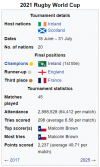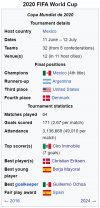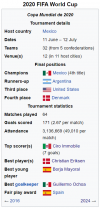(Author's Note - I planned out who would win each game both in the group stage and knockouts before the recent edition of the World Cup ended. Thus, the US triumphing over Netherlands here is not me getting sweet revenge on those cheese-mongering Oranje but rather reflects a world where the US is a second-tier footballing powering with a star over its badge that can reliably do well in knockout stages from time to time)
Round of 16
The Round of 16 opened with the hosts Mexico defeating CONAFA rivals Texas 2-0 in Puebla in a controversial match; Texas was awarded a penalty taken by Jordan Owens, which while missed was heavily protested by Mexican players for a "phantom handball" even after VAR review. Curious refereeing decisions went against Texas shortly thereafter, when a goal by Julian Brooks was ruled offside and a red card was given out to Omar Gonzalez for a foul, after which Mexico converted the ensuing penalty thanks to Hirving Lozano with his first goal of the tournament. Striker Javier "Chicharito" Hernandez added another goal at the 80' minute as a substitute to close out the game. In a classic European rivalry, France and Britain faced off in a World Cup for the first time in 20 years, when France had defeated Britain in the 2000 FIFA World Cup semifinal in Germany. France once again got the best of their longtime rival; though Britain opened scoring at 33' with a goal from Jordan Henderson, Pierre Chevriot equalized at 89', which took the energy out of the British crowd in San Nicolas; at 102', France scored the winning goal on a penalty from Griezmann to go ahead, and after a header from Andrew Robertson went high at 120+2', the game was decided in France's favor. No such drama occurred between Sweden and Colombia in Guadalajara, as Marcus Berg's 25' goal was never relinquished over the next sixty-five minutes and Sweden secured advancement to the quarterfinals for the third time in four attempts. A tense game emerged for USA in Monterrey - Netherlands went up behind an early Jan Vertonghen header, but USA fought back to tie the game on a shock goal from Matt Miazga with an assist from Dunn at 90'+3', with literal seconds remaining in stoppage time, to force added minutes. Goalkeeper Zach Steffen saved two potential goals from de Bruyne in quick succession and then it went to penalty kicks. All five US penalty takers - Pulisic, Luck, Musa Jones, Adams, Haji Wright - got past Andries Noppert, who had been surprisingly subbed in instead of starting goalkeeper Jasper Cillessen, who had started for Netherlands as first-choice since UEFA Euro 2014, where he had won two penalty shootouts; while Netherlands converted their first three penalties from de Bruyne, Frenkie de Jong, and Viktor Janssen, the penalty taken by Luuk de Jong was deflected by Steffen and with substitute Haji Wright's successful fifth penalty for USA, Netherlands were out.
The other half of the bracket saw its knockout round start with one of the greatest upsets in the history of the sport. Ireland, famed as a "giant killer" for improbable group stage and knockout victories in the past, lived up to her reputation with a defeat of Italy in Zapopan. After holding the potent Italian attack of Immobile, Verratti and Paolini at bay for ninety scoreless minutes, Ireland at last triumphed off a header put just behind Gianni Donnarumma by longtime defensive stalwart and added time substitute Paul McShane at 119', stunning Italy and putting Ireland into the quarterfinals for the first time since 2008. Croatia and Denmark went at it at the Estadio Azteca, with Croatia opening scoring at 10' behind Luka Modric's goal from a Kovacic assist, but Christian Eriksen scored his fifth goal of the tournament at 67' on a sliding kick off Nicklas Bendtner to slot the goal in and send the game to added minutes, where excellent goalkeeping brought it down to the last penalty of five with things tied up 2-2, with Andreas Christensen coverting the last penalty to put Denmark in a quarterfinal for the first time since 1992. In Leon, Joel Campbell's bold first goal at 7' looked like it could set the tone for yet another disappointing early knockout exit by Spain, but the 2012 World Cup champions successfully fought back, with a goal at 50' by Mayoral to tie up the game followed by Ferran Torres' sensational late goal headed in off a long volley from Sergio Ramos, playing in his final World Cup, past Costa Rica's mighty Keylor Navas. In the final Round of 16 match, held at the Olimpico in Mexico City, Argentina fell behind 2-0 to Brazil off of goals by Thiago Silva and Vinicius Junior, but fought back with a brace by Lionel Messi before he was subbed off due to cramping and a dazzling goal by Leandro Paredes at the death to put Argentina into the quarterfinals rather than their favored archrivals.
Mexico 2-0 Texas
France 2-1* Britain (aet)
Sweden 1-0 Colombia
USA 1-1* Netherlands (USA pen 5-3)
Italy 0-1* Ireland (aet)
Croatia 1-1* Denmark (DEN pen 3-2) [1]
Costa Rica 1-2 Spain
Argentina 3-2 Brazil
Quarterfinals
With the upsets in the group stage and Round of 16, it was the first time that a quarterfinal had not featured one of Britain, Italy or Germany, and thus the tournament's latter stages would be regarded as unusually open. Mexico, now emerging as a favorite thanks to their rugged defensive play and collected countering, faced France in Leon, where an early Jordan Veretout goal was the first time that an opponent had made their way past Guillermo Ochoa in the tournament. Mexico regrouped and struck back at 75', however, even when it seemed like the hosts were about to face yet another infamous quarterfinal exit, when substitute Chicharito came out onto the field again and scored an equalizer. After a scoreless extra time, Mexico and France faced off on penalties; Mexico converted all but their first, taken by Lozano, while Ochoa denied France and thus allowed captain Guardado's penalty kick to be the one that put Mexico in a semifinal for the first time since 1996, when they last won the World Cup. Meanwhile, in Zapopan, USA faced Sweden at El Chivas and once again fell behind initially, thanks to a goal by Rohden shortly after the half. With the clock ticking down to elimination and yet another improbable semifinal run by Sweden four years after having done it in France, American fortunes changed with Andrew Luck's shocking equalizer at 86'. At 106', having seen an Emil Forsberg goal disallowed as offside, the United States got a break on the counter and Pulisic scored his third goal of the World Cup to put the United States ahead and push them into the semifinals for the first time since 2008, when they won on home soil. [2]
On the other bracket, the two miracle teams of the tournament in Ireland and Denmark squared off at the BBVA in Monterrey, where a tense goalless draw that saw Irish winger Robbie Brady sent off with a red ended in extra minutes thanks to Christian Eriksen's bicycle kick into net at 110', sending Denmark to their first-eve World Cup semifinal. Spain's effort to make it two championships in eight years ended shortly thereafter as well at the Olimpico came to a sudden end, where after leading for much of the game thanks to Torres' goal, Nicolas Otamendi and Aguero each scored once at 82' and 86' to go ahead with a dagger to Spanish hearts, the first Argentinean semifinal appearance since 2004.
Mexico 1-1* France (MEX pen 4-2)
USA 2-1* Sweden (aet)
Ireland 0-1* Denmark (aet)
Spain 1-2 Argentina
Semifinals
Exhausted after two consecutive added minute games and with Pulisic picking up an injury in the quarterfinal triumph on his goal, when USA faced Mexico in Puebla it was running on fumes and played accordingly. Jonatan dos Santos scored at 23' to put Mexico ahead and the hosts subbed in defenders starting at 60' to take advantage of noticeable American fatigue at the high elevation and press their advantage. With the 1-0 victory, Mexico advanced to its sixth World Cup final and maintained its perfect 6-0 record in semifinal matches. Despite five shots on goal by Christian Ericksen, Argentina took advantage of similar Danish fatigue and ran up the score, with Messi, Paolo Dybala and Angel Di Maria all finding the net in the first half and Argentina cruised into its first final since 2004, maintaining her similar perfect 6-0 semifinal record.
Mexico 1-0 USA
Argentina 3-0 Denmark
Third Place
USA and Denmark would face off for the bronze in Guadalajara; for the fourth straight game in the knockout rounds, the United States fell behind thanks to Bendtner's header off an Ericksen assist at 38'. However, shortly thereafter, Lattimore scored on a Luck cross and Adams picked up his fourth goal of the tournament, bringing him level with teammate Luck, on a header off of corner kick from the same at 90+1'. With the win, USA won its third bronze medal, and Luck would go on to add to his three Man of the Match honors (including for the third-place playoff) the Silver Ball as the second-best player of the tournament with four goals, four assists and several crucial plays.
USA 2-1 Denmark
Final
(Dedicated update on Final to come)
[1] Croatia IOTL, of course, thrives on penalty kicks, so this is maybe a bit ASB haha
[2] I'm excited for when I eventually work my way backwards to this one... hehe



